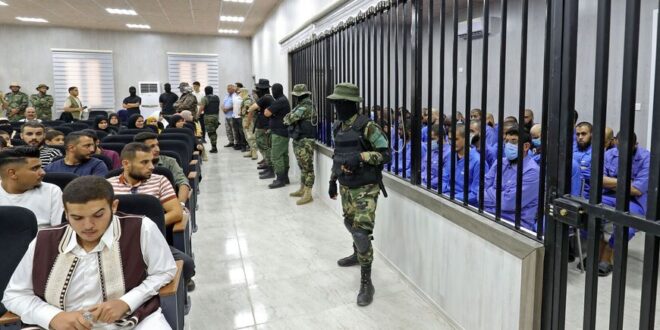The Islamic State has exploited the chaos in Libya to extend its influence.
Libyan authorities have arrested an Islamic State leader suspected of having planned three deadly attacks in Libya’s capital in 2018, the UN-backed government announced on Thursday.
The head of the Tripoli-based Government of National Unity, Abdel Hamid Dbeibeh, said the arrest was made during a joint operation carried out by the state-backed Deterrence Apparatus for Combating Organized Crime and Terrorism and the Rahbat Aldrou faction in the town of Tajoura, east of Tripoli.
In a televised speech, Dbeibeh stressed his government’s commitment to the fight against terrorism and to prosecute anyone involved in acts of terror.
The arrest was confirmed by the Deterrence Apparatus for Combating Organized Crime and Terrorism. In a statement on Facebook, the group said the arrest was the product of five years of cooperation with the Rahbat Aldrou faction.
The statement identified the suspect as Tarek Anwar Abdallah, nicknamed “Abu Issa,” who is accused of planning and overseeing 2018 terror attacks on vital facilities in Tripoli.
On May 2, 2018, IS claimed responsibility for a suicide attack on the headquarters of the Libyan High Electoral Commission in Tripoli that killed 14 people. In September, another suicide attack claimed by IS targeted the Tripoli-based headquarters of the Libyan National Oil Company. Two people died in the attack, while 10 company staff were injured.
IS struck again in December 2018, when suicide bombers stormed the Foreign Ministry headquarters in the capital and blew themselves up, killing three people and wounding 21 others. A senior diplomat was among the victims.
IS has taken advantage of the security and political chaos that plagued Libya following the fall of longtime leader Moammar Gadhafi in 2011 to gain a foothold in the North African country. The strategic city of Sirte was IS’ stronghold in Libya until late 2016, when forces loyal to the internationally recognized government in Tripoli backed by US airstrikes expelled the group.
IS cells have continued to make sporadic attacks in the country as the authorities work to eliminate the group’s remnants. In May, a court in the northwestern city of Misrata sentenced 23 IS members for killing dozens of people, including beheading 21 Egyptian Christians in Sirte 2015. In December last year, 17 former members of IS were also sentenced to death for killing 53 people in the western city of Sabratha.
 Eurasia Press & News
Eurasia Press & News



